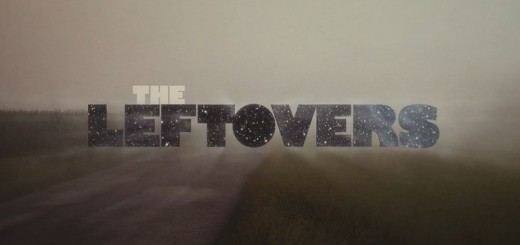13 REASONS WHY Review
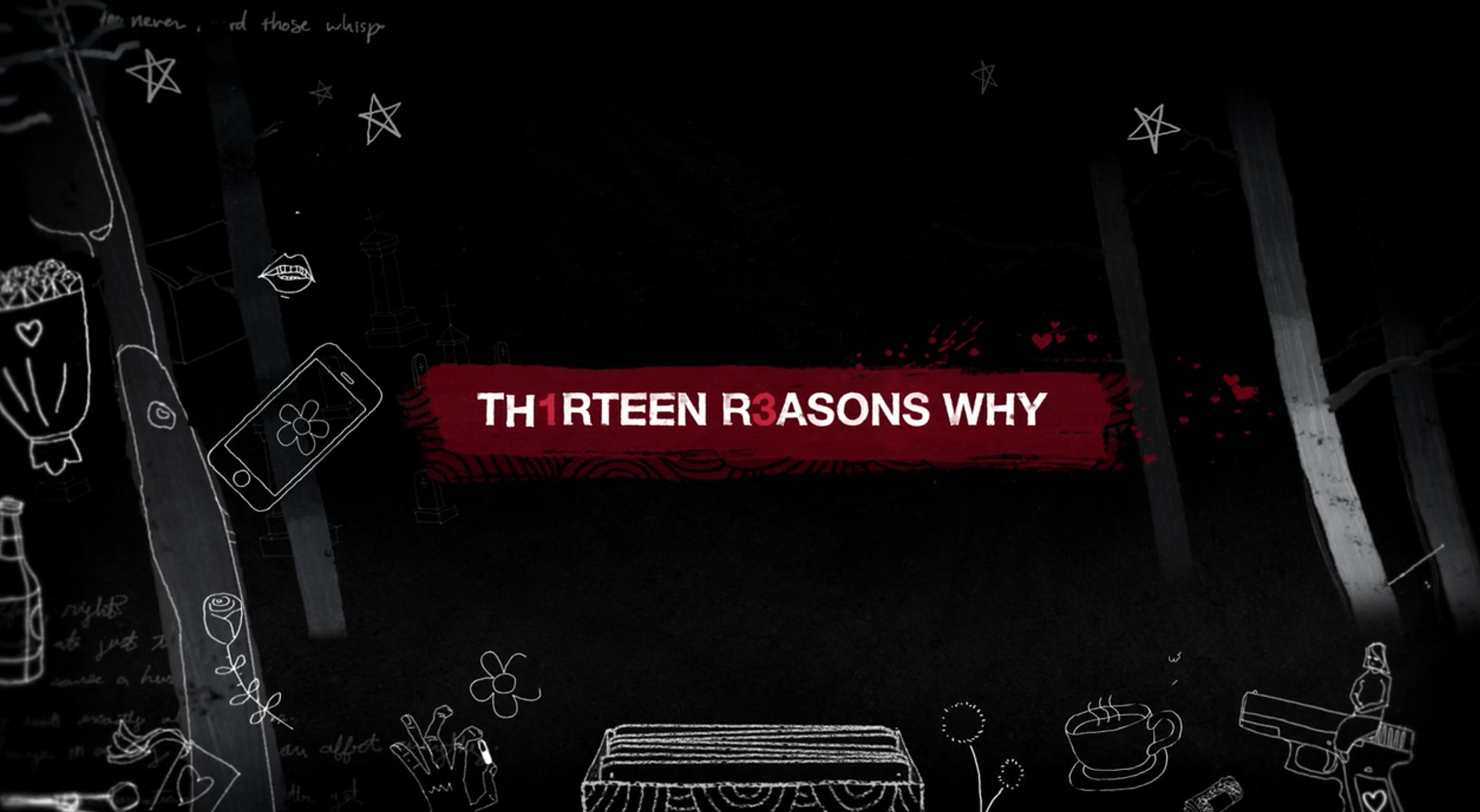
13 REASONS WHY is actually kind of a lie. There are both more than and less than 13 reasons why young Hannah Baker decided to commit suicide. Yes, there are 13 tapes that she recorded detailing her high school life and how it all went wrong (and who’s responsible for it), but a few of the tapes were not actually reasons why she did it, but rather apologies and explanations to those she left behind. And, of course, there’s always more than 13 little reasons why a girl could become so depressed and helpless that she would even consider taking her own life. And so in this way, the catchy little title is misleading. And I have to admit that I was also misled, but for different reasons.
When I first began watching, I took issue with the main premise. It seemed like it portrayed suicide as something less than serious, something that high schoolers like Hannah can do to make their friends feel guilty for their drama and bitchiness. I was worried this painted both suicide and mental health in a dangerous light and would give impressionable and possibly suicidal youth a bad idea of the same. I also just couldn’t believe that a girl who was considering her own death, a girl who was in such a dark place, would drop everything and spend hours (or days) recording the little details of her life thus far. To me, the high schoolers in the show felt one-dimensional and unrealistic, from their clothes and their dialogue to their personalities and motivations. Hannah and her first couple of friends formed an alliance over their use of “FML” to communicate their feelings (FYI to all Netflix writers: teenagers don’t actually use most internet acronyms in daily speech, but thanks for underestimating us yet again). But, surprisingly for a binge-watch streaming show, 13 REASONS WHY actually got stronger and better as I watched on.
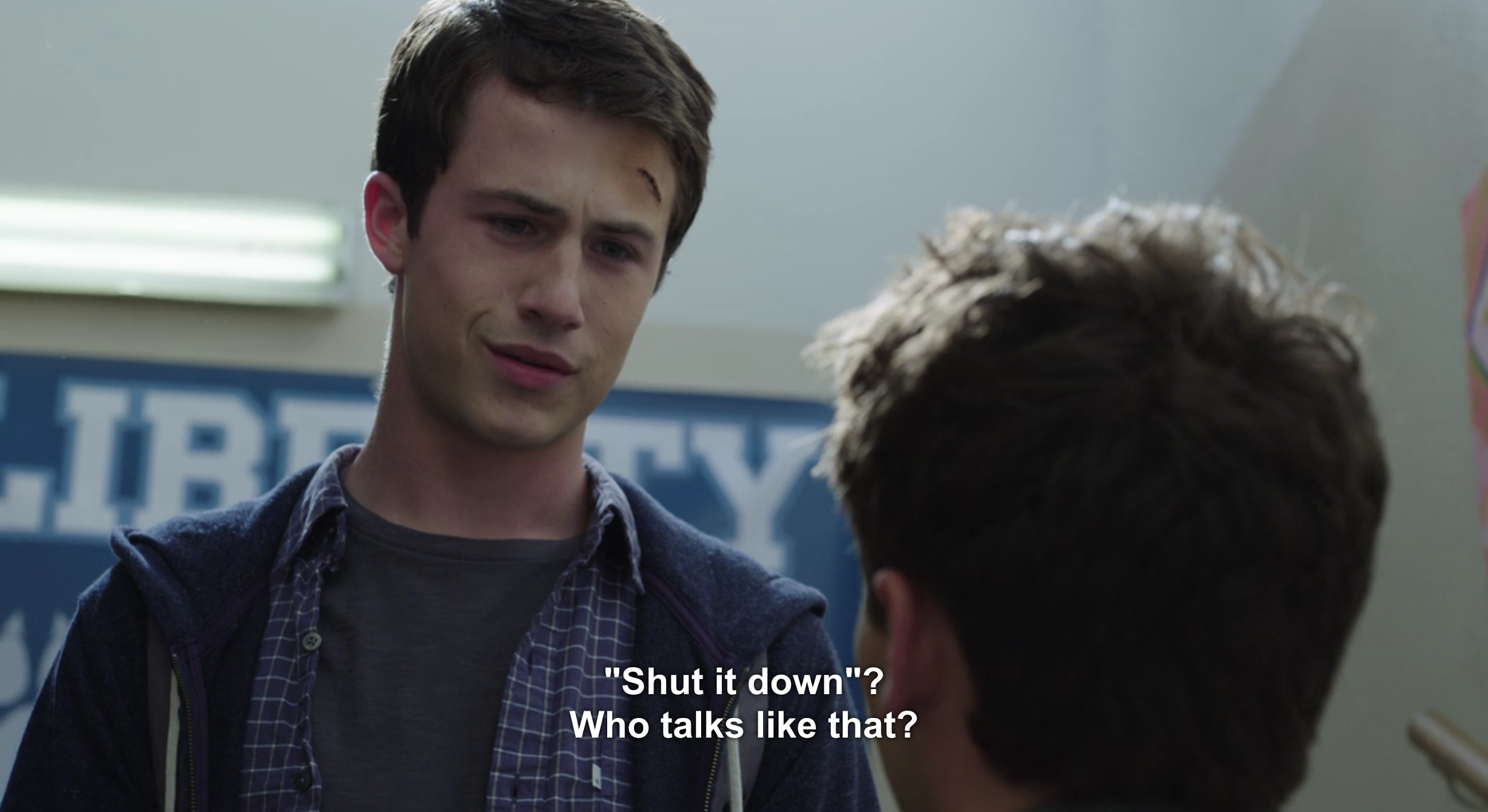
In which I am Clay reacting to all of the teenagers on this show
Several characters named on Hannah’s tapes as reasons why she killed herself, namely Justin, Zach, Clay, and Jessica, initially seemed somewhat cliché and surface-level. But, by later episodes, they were further developed and felt much more real. In the beginning, their bullying didn’t seem to make much sense; in fact, I got the impression that these were your typical high school movie bullies that don’t have much motivation other than their innate “evilness.” But as Hannah explains and calls out all of their actions, things become both more believable and despicable.
A common thread among her complaints about the boys of the show is their ludicrous reactions to being told “no”—hiding anonymous class compliments from her to putting her on a list as “Best Ass,” causing her to become a target for harassment from the rest of the male high school population. Name-calling, stood-up dates, yelling, and defensiveness, all common reactions of the show’s boys to a girl telling him (quite possibly for the first time in his life) “no.” This is a real side to boys and high school (and life in general) that is rarely so well depicted, especially in media aimed at teenagers. People make gut decisions and have emotional reactions based on their pain, and it often hurts those around them. People also don’t like to own up to their mistakes, and sometimes selfishly hide their problems and accidents to avoid humiliation or punishments. It’s these facts of human nature that cause Hannah’s bullying and high school pain. I must commend 13 REASONS WHY for bringing up and showcasing these true to life characters—the teenagers who react like real teenagers to their difficult surroundings and aren’t idealized or “easy” versions of themselves.
Another commendable aspect of the show (and another issue that is rarely well-portrayed in ANY media) is its depiction of rape. The skirting of the issue, with the perpetrator’s friends conflicted over whether to defend him or keep quiet, the poor girl’s difficult reaction to what happened, even just the fact that the rape was committed by a friend (a douchebag football player) during a party. The commitment to realism—even in the graphic and fast-paced style of filming—is very obvious. Even when Hannah comes forward about what happened and the adults in her life question her, their response is painstakingly realistic and infuriating. Her counselor alleges that maybe she just regrets having sex with the guy and is making it up, that these are serious accusations, and ultimately doesn’t even report what she tells him (despite his legal obligation to do so). On the flipside of this, Clay, our protagonist, asks for consent in a clear and responsible manner once things begin to heat up with a girl. Having a character on television ask the love interest whether it’s alright if he continues may not seem like a big issue, but healthy depictions of sex and consent are hugely important and very refreshing to see.
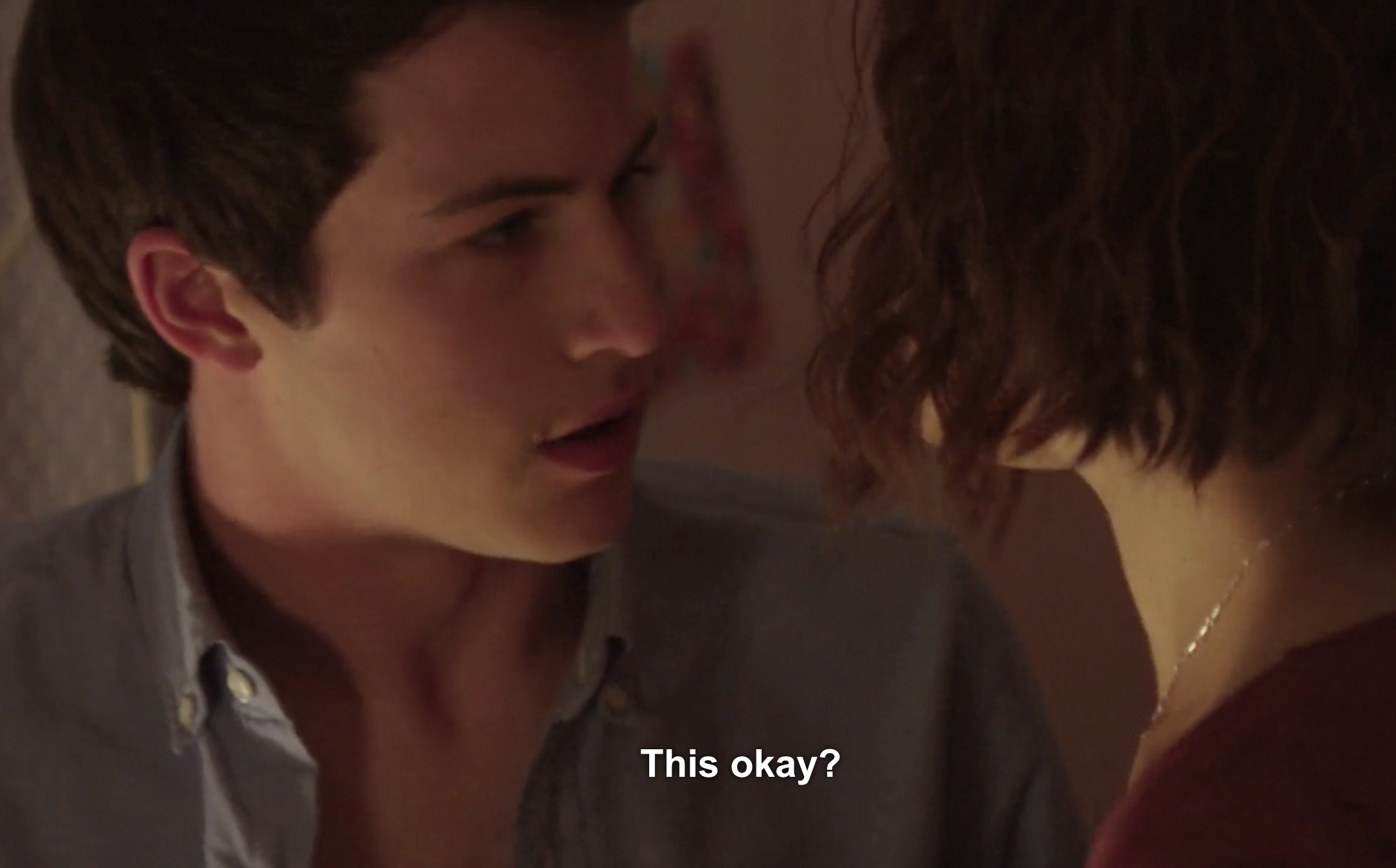
I am all about consent!
However, despite these truly admirable details of 13 REASONS WHY, I still find myself struggling over the central concept. I admit that I got sucked into the show a bit—with all of the drama, cliffhangers, and mystery I found myself really anticipating the next episode. In fact, one might reasonably consider it a good show, if so inclined, especially if it had nixed the suicide element. No matter how you spin it, the show romanticizes the idea of suicide in some capacity. Either Hannah wanted to use the tapes as an enactment of revenge (to fairly good success), or her brutal suicide (shown in a gruesome and difficult-to-watch scene in the finale) is a sympathetic inevitability, due to her struggles and bullying. These outcomes both seem pretty dangerous and potentially encouraging to damaged watchers. And to me, even by the end of the show, she doesn’t seem deranged or troubled enough to seriously consider it, let alone go through with it. How can a show, whose central premise revolves around suicide prevention, treat its damaged girl and mental health itself with such disrespect?
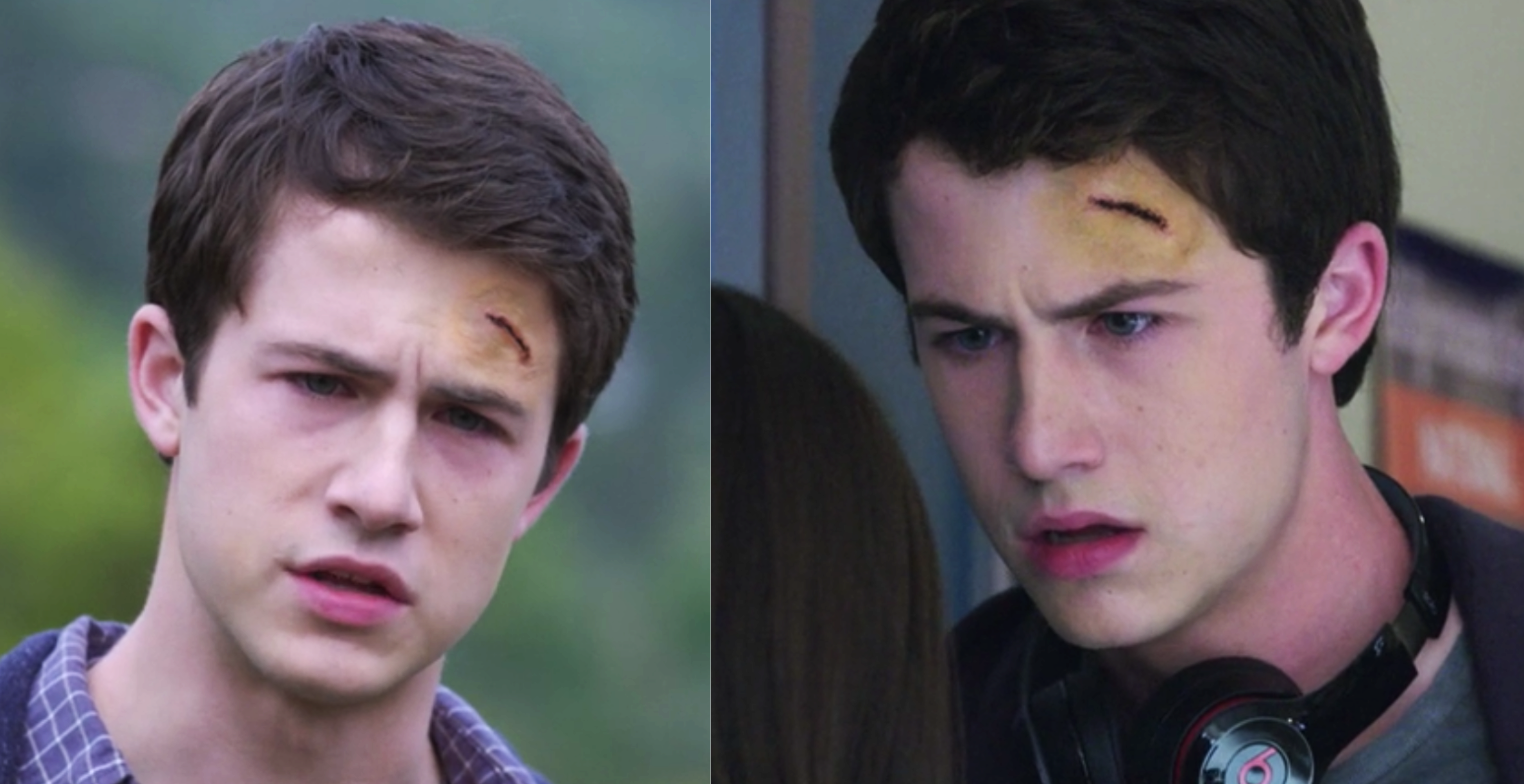
I really hope the makeup artist was fired for this . . . monstrosity
Other problematic elements include the scene where Clay laments for Hannah, and wishes that he had saved her instead of being “too afraid to love her.” Corny, definitely. Sending a negative or even flat-out wrong message? Maybe. Yes, it’s true that love and romance cannot stop one’s mental health issues, and this is a harmful stereotype to perpetrate. But it is true also that being a friend to someone or reaching out CAN really help prevent suicide. People should have not only been nicer to her throughout, but also looked out for her once they became suspicious about how she was feeling. Their romance realistically would not have “cured” Hannah, but if he talked to her about what was going on, it might have made a difference.
13 REASONS WHY falls victim to many of Netflix’s common pitfalls: excessively long episodes and seasons (the entire first season was thirteen hours long!) and relying on the set-up up for a second season. How can this show continue without the titular tapes or its leading character? The show may be a step in the right directions on many fronts, but still treads a lot of the same, clichéd water.
Verdict: Do Not Recommend

